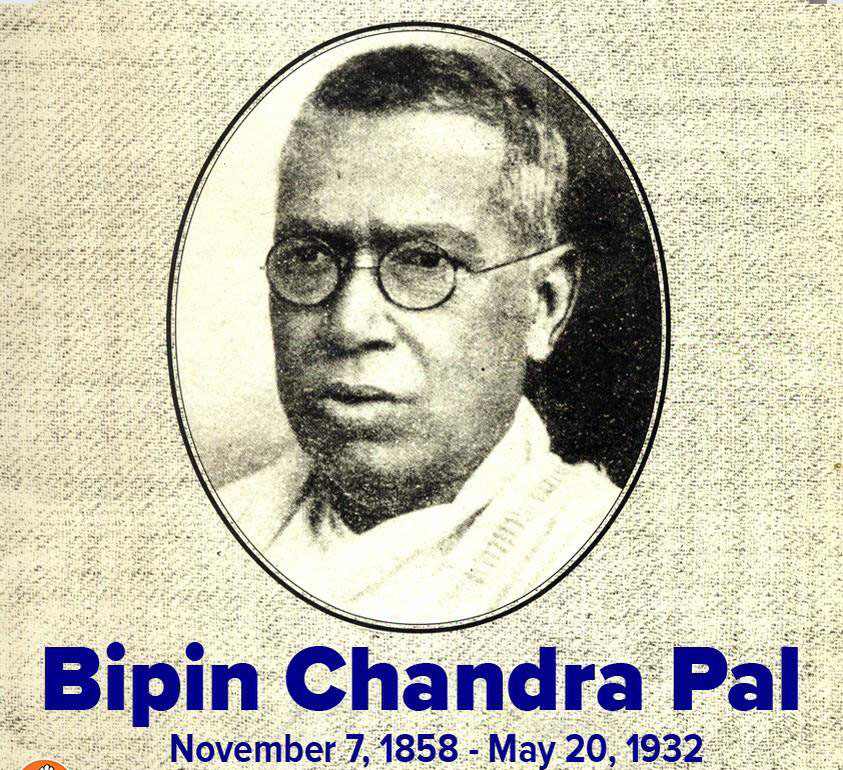Bipin Chandra Pal, a nationalist politician, renowned orator and writer, was born on November 7, 1858, in Poil, a village in Habiganj District (Sylhet), now a part of Bangladesh, to a wealthy Hindu Kayastha family. He was part of a group of leaders including Lala Lajpat Rai, Bal Gangadhar Tilak and Aurobindo Ghosh, collectively known as ‘militant nationalists’, representing the more assertive nationalism of the early independence movement.
Pal’s father Ramchandra, a village zamindar, was familiar with both Hindu rituals and Islamic thought. After completing his school education, Pal enrolled for a short while in Calcutta’s Presidency College. In the 1880s and early 1890s, he worked as a teacher and administrator in various schools and a librarian in Calcutta.
In Calcutta, he got to know leaders such as Keshab Chandra Sen, Shivnath Shastri and and Bijoy Krishna Goswami. Pal was associated with the Indian National Congress, since it was founded in 1885. He attended the party’s second annual session in Calcutta in 1886 and the third annual session in Madras in 1887. In 1898, he went to England to study comparative theology, but returned a year later. He was an enthusiastic and early proponent of the idea of swaraj.He started a magazine, New India, which aimed to be, as he put it, “intensely national in spirit, breathing the deepest veneration for the spiritual, moral and intellectual achievements of Indian civilization and distinctly universal in aspiration”. In 1904, he presided over the Bombay session of the Congress.Pal blasted the British move to partition Bengal in 1905, and started a paper, Bande Mataram, to spell out his nationalist views. Aurobindo Ghosh joined as an editor of Bande Mataram, and the two leaders developed a special bond. Convinced that the partition was a shrewd move by the British to split the rising nationalism and political consciousness in Bengal, Pal became a prominent leader of a broad anti-partition front, and took his agenda even to places like Madras. He championed the swadeshi movement that was born in response to the partition of Bengal.An impressive orator, Pal said at a speech during the Calcutta session of the Indian National Congress in December 1906: “You will have observed the word ‘boycott’ attached to the word ‘movement’. It means that it shall move, move from point to point, move from city to city, move from division to division, move from province to province till we realise the highest destiny of our people as a nation in the comity of nations. I mean swaraj.”However, there was a split within the Congress as Pal and other militant nationalist leaders wanted to use the momentum gathered by the swadeshi and boycott movements to spark a pan-national struggle against the British; the ‘moderates’, on the other hand, felt the time was not ripe to go so far. In 1907, Pal was jailed for refusing to give evidence against Aurobindo in a sedition case. After he was released from jail, he went to England, in 1908, and lived there for three years.Pal made major contributions as a journalist and writer. He started the Bengali weekly Paridarshak in 1886, worked as an editor of the Bengali Public Opinion and had short stints with the Lahore Tribune, The Democrat and The Independent. His books include a Bengali biography of Queen Victoria, Indian Nationalism, Swaraj and the Present Situation, and The Basis of Social Reform.Since he was a member of the Brahmo Samaj, he championed the cause of social reforms in Hindu society. He married Nrityakali Devi, a widow, in face of opposition from his family. One of the earliest causes that Pal vocally took up was that of the harsh treatment meted out to workers at Assam’s tea plantations. Pal’s intellectual concerns were broad.In a series of memorable speeches at the 1907 Madras session of the Congress, he spoke on a wide range of issues, the British system of education being imparted to Indians, among them: “The education that you have been receiving all these years has been shallow and because of this fact, namely, that the education has been verbal education, it had no reference to things but words,” he said. “It helped develop our memory but never our sense or our understanding as it ought to have done. And the result is that not only we have suffered in intellectual life, but we have suffered in our ethical, our artistic and our spiritual life as well.”Independence activist and educator V. S. Srinivasa Sastri, an impressive orator himself, vividly recorded his impressions of Pal’s oratory during the Madras session: “Babu Bipin Chandra Pal burst into full fame in Madras as a preacher of the new political creed. For several days…he spoke words hot with emotion and subtle logic, invading their [the listeners’] whole souls. [T]he power of the spoken words had never been demonstrated on such a scale.”Bipin Chandra Pal played an important role in India’s freedom struggle at multiple levels, as politician, thinker, writer and activist. As Prime Minister Jawaharlal Nehru said about him: “[He was] a great man who functioned on a high level on both religious and political planes.”





0 Comments
You must be logged in to post a comment.